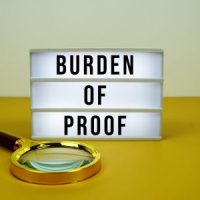What Is the Burden of Proof in Pennsylvania Criminal Cases?

In Pennsylvania, when someone is charged with a crime, specific standards must be met before they can be convicted. One of the most crucial legal concepts involved in Pennsylvania criminal cases is the concept of “burden of proof.” This concept plays a vital role in determining whether the defendant should be convicted or acquitted based on the presented evidence.
If you are facing criminal charges in Pennsylvania, it is crucial that you understand how the concept of “burden of proof” works. Understanding this concept can make a huge difference in your case.
Defining Burden of Proof
Burden of proof is a legal concept that outlines who must prove the facts of a case and to what extent. In Pennsylvania criminal cases, the prosecution carries the burden of proof. This means it is up to the prosecution to establish the defendant’s guilt. Until the prosecution has proven your guilt, you are presumed innocent.
The prosecution bears the burden of presenting sufficient evidence to build a credible case. You, as the defendant, are not required to prove anything. In fact, you don’t have to testify, call witnesses, or present any evidence. The prosecution bears the burden of convincing the judge or jury of their claims to a legally defined degree. For Pennsylvania criminal cases, the prosecution must establish the defendant’s guilt “beyond a reasonable doubt.”
The Meaning of Beyond a Reasonable Doubt
“Beyond a reasonable doubt” is the highest standard of proof in the legal system. For someone to be convicted of a crime in Pennsylvania, the prosecution must prove all the elements of the crime beyond a reasonable doubt. This standard of proof means that the prosecution must convince the judge or jury that no other reasonable explanation can come from the evidence presented. In other words, if the judge or jury finds themselves unsure about whether the defendant committed the crime after considering all the evidence presented, they should acquit the defendant.
The “beyond a reasonable doubt” standard exists to prevent wrongful convictions. Because criminal convictions can lead to serious consequences, such as imprisonment, the legal system requires prosecutors to meet this high standard of proof before someone is declared guilty and sentenced. If the prosecution cannot prove just one of the elements of the crime beyond a reasonable doubt, you cannot be convicted.
Do Defendants Ever Have the Burden of Proof?
While in most cases criminal defendants do not carry the burden of proof, there are some situations where a defendant may take on a limited burden without shifting the overall burden of proof from the prosecution. For instance, if you raise an affirmative defense such as self-defense, insanity, or duress, you may need to prove that defense.
However, unlike the prosecution, which must prove its case beyond a reasonable doubt, you are only required to meet the “preponderance of the evidence” evidentiary standard. This much lower standard requires you to show that your defense is more likely true than not true.
It is crucial to note that, even if it seems as though the prosecution has strong evidence against you, there may be gaps, weaknesses, or constitutional violations that can lead to an acquittal. A skilled criminal defense attorney can evaluate the strength of the prosecution’s case and help you build a strategy to challenge it.
Pretrial Motions
You may also have a legal basis for filing a Pre-Trial Motion depending upon the facts of your case. These Pretrial Motions may include a Motion to Suppress evidence obtained in violation of your constitutional rights, motions to dismiss under Rule 600 for your right to a speedy trial, or for dismissal of charges filed outside the applicable statute limitations for a particular crime. For certain pretrial motions, the Commonwealth bears the burden of going forward with evidence and establishing that the challenged evidence was not obtained in violation of a defendant’s rights.
Contact Us for Legal Help
If you’re facing criminal charges, contact our skilled Lehighton & Carbon County criminal attorney at The Law Office of Adam R. Weaver, Esq., for help protecting your rights and building a strong defense strategy.
